
Managing and leveraging customer information has become a foundational aspect of success for businesses across industries. As companies handle larger contact lists and more interactions, the need for a smarter, more unified system becomes clear. A strong contact management approach, especially when paired with a well-designed CRM system, helps teams keep everything in one place, follow up on leads, deliver personalized experiences, and work more efficiently. In this article, we dig into the real, practical advantages of using contact management software combined with powerful CRM software to help small businesses and growing teams gain a clear edge.
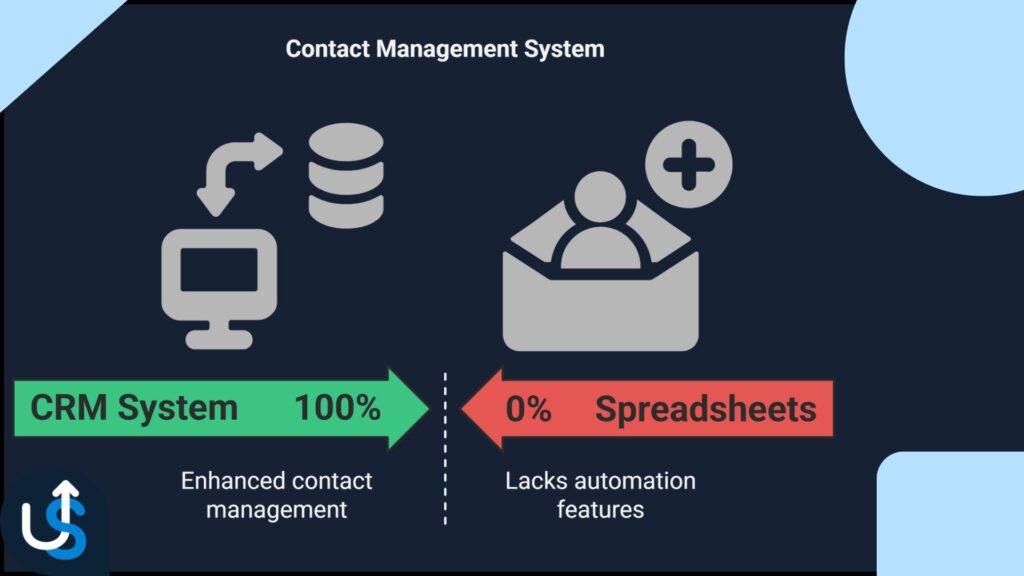
Contact management involves the process of storing, classifying, and retrieving contact data like names, phone numbers, email addresses, and company information. Businesses traditionally used spreadsheets or paper records, which are often error-prone and inefficient. With modern contact management software, companies gain better control over data through a centralized contact database that is straightforward to access, update, and share.
While manual methods like spreadsheets may work temporarily, they lack the scalability and automation features offered by a dedicated contact management platform. The pain points of using disconnected tools include duplicate entries, missed follow-ups, and time-consuming searches for information. These problems can be fixed by using a digital contact management system.
Struggling to keep your client list in order or dealing with scattered contact files? Many businesses face this challenge before adopting a structured system. Check out our article on Is Your Client List a Mess? Find Out How Upsurge CRM Contact Management Organizes It to see how you can bring order to the chaos.
A CRM system is a type of management tool designed to centralize, automate, and improve interactions with customers. CRM software enhances contact management by providing tools that track communication history, sales activity, and customer preferences.
By integrating contact management tools with a full-featured CRM platform, businesses can manage customer journeys from initial inquiries to post-sale support. This centralized contact database ensures that all departments, from marketing to customer service, are working with the same accurate customer data. For small businesses, investing in a robust CRM system is critical for maintaining growth and ensuring no sales opportunity slips through the cracks. CRM software usage saw a modest increase among small firms (39%), which is above the average of 31% across all firm sizes, suggesting growing awareness of client relationship tools.
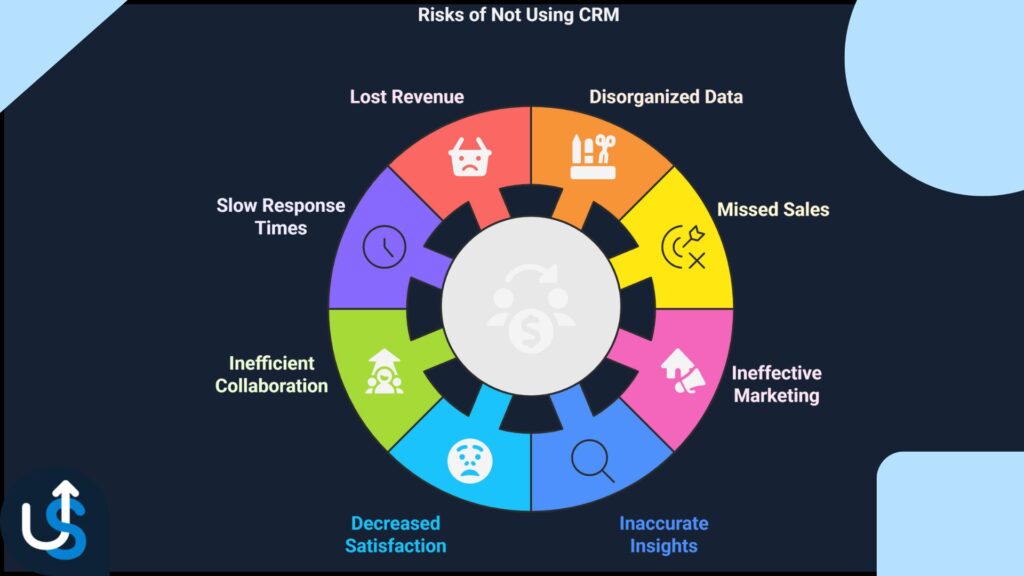
Without a CRM tool to manage contact details, businesses often suffer from fragmented customer information. Teams may store data in various formats and locations, leading to confusion and inefficiencies. A centralized contact management system eliminates these issues by consolidating everything into a single, searchable contact database.
When companies don’t use CRM software for contact management, important sales leads can be overlooked. A lack of follow-up due to poor tracking and no automated reminders results in lost deals. With a CRM system, teams can monitor lead stages, assign responsibilities, and maintain consistent communication.
Poorly targeted marketing is often the result of insufficient customer data and segmentation. Without a contact management tool, personalization becomes impossible, leading to low engagement. A CRM platform allows for precise targeting based on behavior, demographics, or purchase history, enhancing marketing effectiveness.
Businesses that don’t use CRM analytics have a hard time understanding customer behavior. This lack of insight hampers strategic decision-making and growth. A CRM system offers in-depth analytics and reports, helping you refine your sales process and marketing campaigns.
Without a unified view of customer information, delivering timely and relevant service becomes challenging. CRM software ensures every interaction is recorded so your team can respond promptly and accurately. Better service leads to improved customer relationships and loyalty.
When departments use separate tools for managing contact information, collaboration suffers. Sales and marketing groups typically work in silos, resulting in disparate messaging and efforts. A shared CRM platform ensures everyone is on the same page, boosting efficiency and results.
Delays in accessing contact details often result in slow response times. Customers expect quick answers, and a lack of a proper contact management platform can damage your brand reputation. A centralized CRM system enables faster access and action.
The cumulative effect of disorganization, poor follow-up, and missed opportunities is lost revenue. Businesses that don’t use CRM software for contact management struggle to scale. Over time, these inefficiencies hinder long-term success.

A contact management system consolidates all your contact information into one unified contact database, replacing outdated spreadsheets and fragmented tools. This makes it easier for your team to retrieve, update, and act on data in real-time.
Modern CRM software can automatically gather customer information from forms, emails, chats, and social media. This ensures your contact database is always current and complete, reducing the chances of data loss or redundancy.
Manual entry of contact details often leads to errors and duplicates. A CRM system with automation ensures clean, accurate data, which is essential for making informed decisions and driving personalized communication.
A key feature of any contact management tool is the capability to segment contacts based on criteria like behavior, industry, and lifecycle stage. This empowers businesses to tailor marketing campaigns and build more meaningful customer relationships.
Knowing a customer’s full history helps in building trust. With a CRM system, your team can view past communications, purchases, and preferences, allowing for thoughtful, context-aware interactions that deepen customer relationships.
CRM software helps capture and track sales leads across the entire sales process. Automated follow-ups, task assignments, and status tracking ensure that no opportunity is missed.
With a shared contact management platform, both marketing and sales teams can access the same customer data. This eliminates inconsistencies and promotes coordinated efforts, improving overall efficiency.
Built-in analytics tools within a CRM platform provide valuable insights into performance trends, engagement, and conversion rates. These data-driven decisions strengthen your strategy across sales, service, and marketing campaigns.
A cloud-based contact management system allows your team to access data from anywhere, making it perfect for remote work or field sales. This ensures your contact information is always at your fingertips.
Historical customer data helps you identify at-risk clients and proactively re-engage them. With personalized messages and timely interventions, your business can improve retention using the CRM system.
Targeted marketing campaigns, improved lead nurturing, and streamlined workflows lead to better results. Investing in a powerful contact management platform ensures a high return on your CRM software investment.
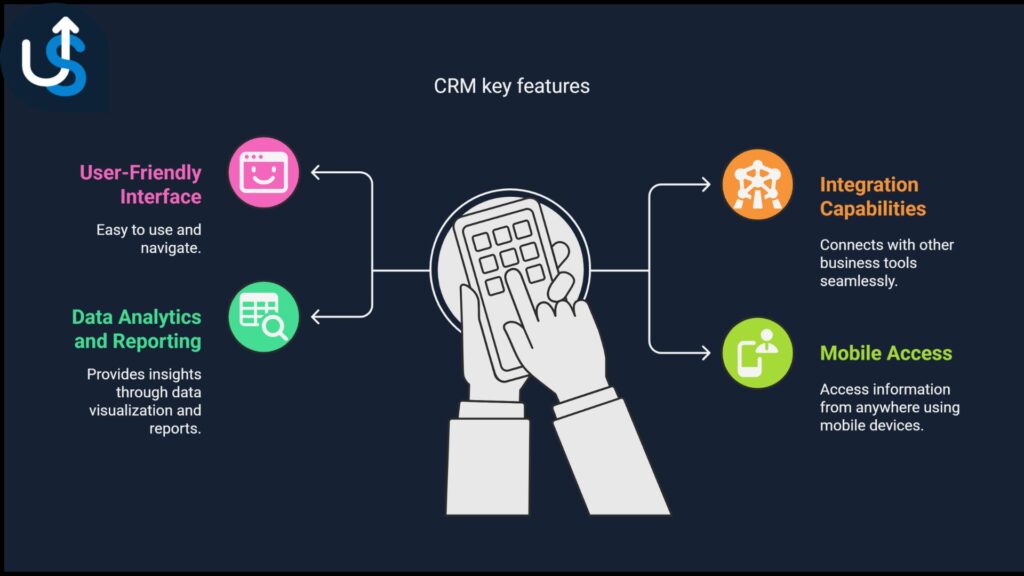
A simple, intuitive dashboard ensures your team adopts the contact management tool quickly. If it’s hard to use, it won’t be used, hurting the effectiveness of your CRM system.
Your CRM platform should connect seamlessly with other tools like email, calendar, social media, and marketing automation software. This ensures your contact management system operates as part of a complete ecosystem.
Effective CRM software includes customizable dashboards and detailed reporting. These features allow you to track performance, predict trends, and refine your sales process and marketing campaigns.
With mobile-friendly contact management tools, your team can view and update contact details on the go. This increases responsiveness and keeps your sales team informed and agile. 70% of businesses use mobile CRM systems to enhance their sales strategies.
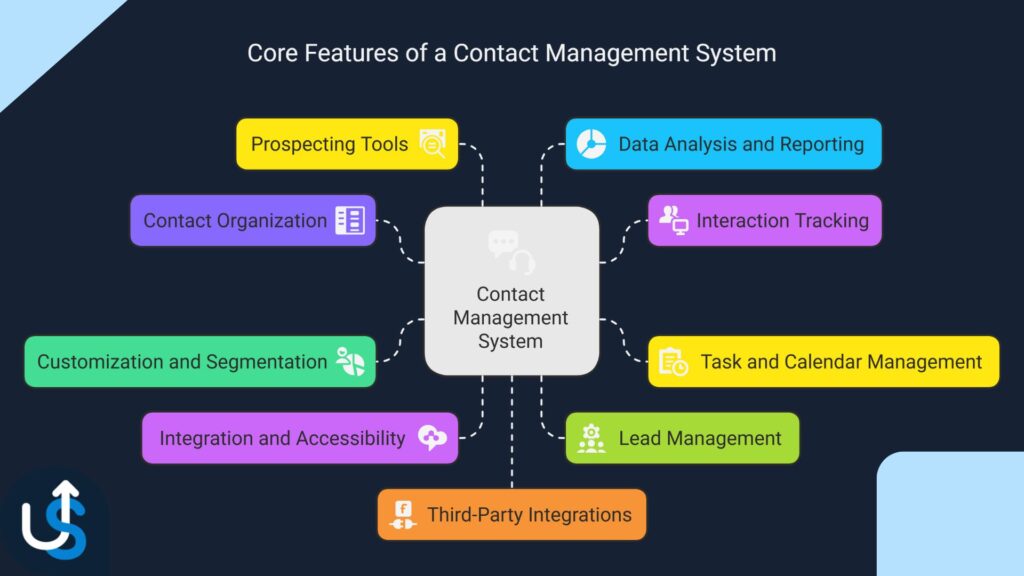
Easily categorize and tag contact information for filtering and segmentation. This improves workflow efficiency and allows for faster retrieval of key customer data.
Every call, email, or meeting can be logged in the CRM system, offering a complete timeline of customer relationships. This ensures consistent communication.
Manage appointments, follow-ups, and reminders within the contact management platform. Integration with your calendar ensures that no task is overlooked.
Your contact management software should allow for custom fields and views tailored to your business needs. Segmenting contacts makes it easier to launch targeted marketing campaigns.
Cloud-based CRM tools enable collaboration across departments and devices. Accessibility ensures that your team can manage contact details anytime, anywhere.
Capture and manage sales leads from multiple sources in one CRM software. Assign leads to team members and track progress throughout the sales process.
Advanced CRM systems offer prospecting features like lead scoring, email tracking, and automation to help identify new customers.
Use your contact management system to monitor engagement metrics, KPIs, and outcomes. This informs better business decisions.
A versatile CRM platform should sync with external tools, including marketing, billing, and project management apps. This extends the power of your contact database.
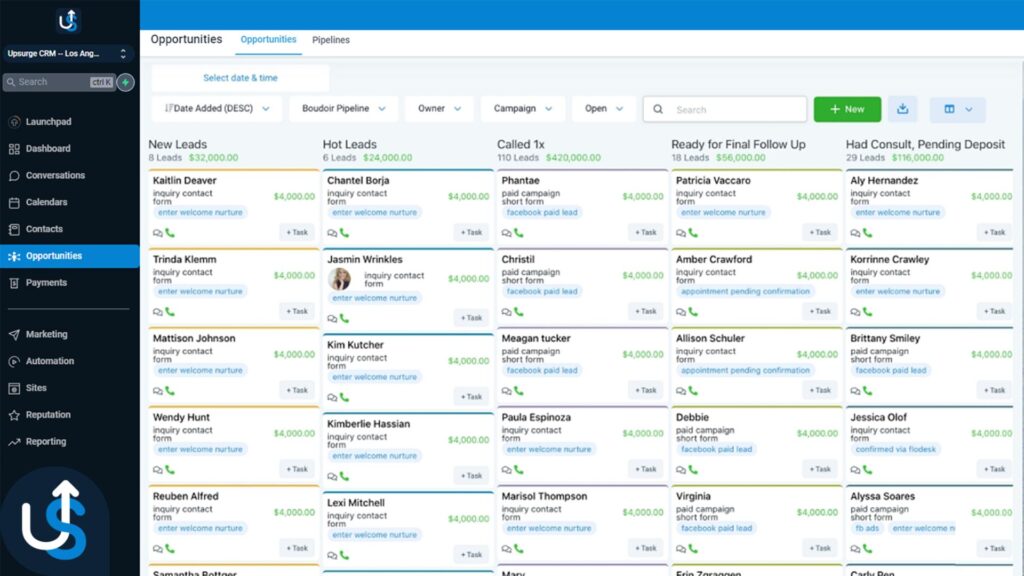
At Upsurge CRM, we combine powerful contact management software with smart automation, analytics, and mobility features. Our CRM system is designed to help small businesses eliminate spreadsheets, improve customer relationships, and grow their revenue.
Whether you want to track sales leads, launch personalized marketing campaigns, or build a complete contact database, Upsurge CRM is your all-in-one solution.
We provide the tools you need to manage your contacts, streamline your sales process, and unlock your business potential. Try Upsurge CRM and experience how the right CRM tool can transform your workflow.
In summary, using a robust CRM system for contact management empowers businesses to collect, organize, and act on customer data with greater precision. From eliminating outdated spreadsheets to enhancing customer relationships, improving marketing campaigns, supporting lead management, and enabling mobile accessibility, the benefits of a well-rounded contact management platform are undeniable. By choosing a system that integrates all essential features, including automation, analytics, task scheduling, and third-party integrations, businesses are better equipped to grow efficiently and serve their customers more effectively.
Experience the full power of smart contact management. Get started with Upsurge CRM today and take control of your customer relationships like never before.
